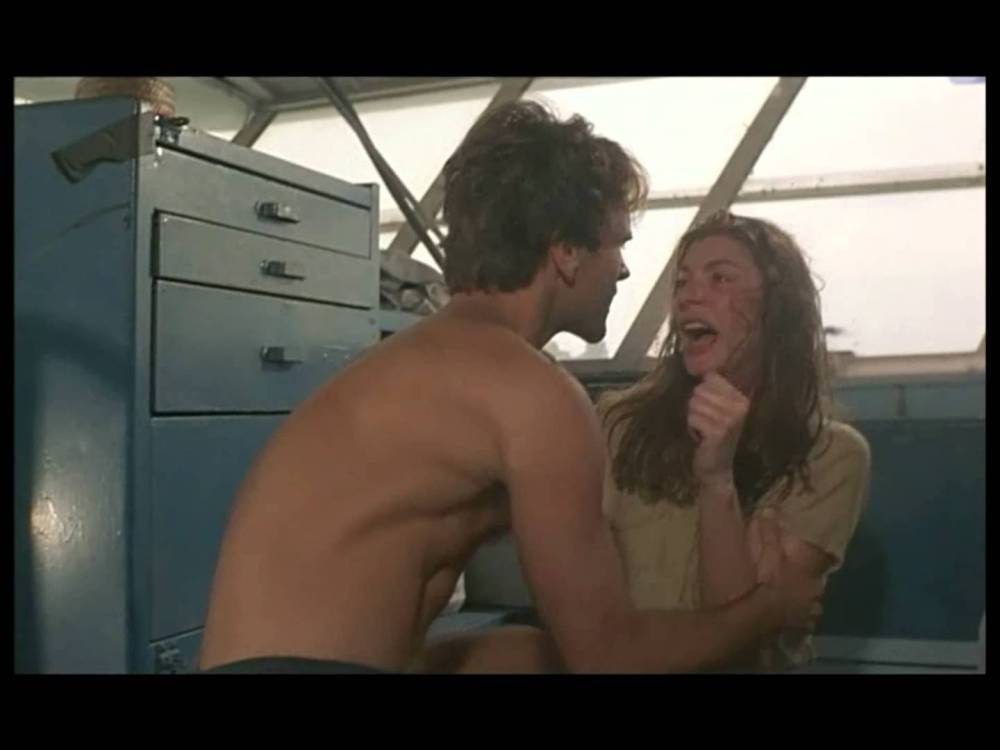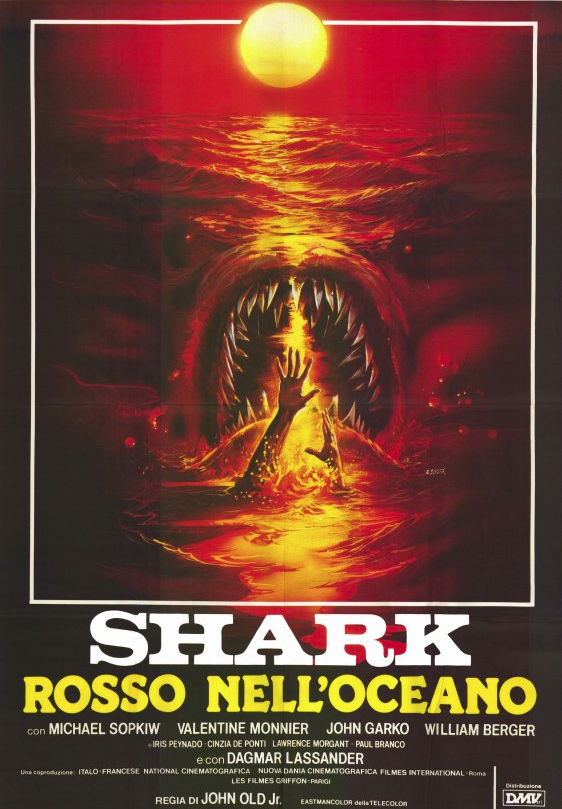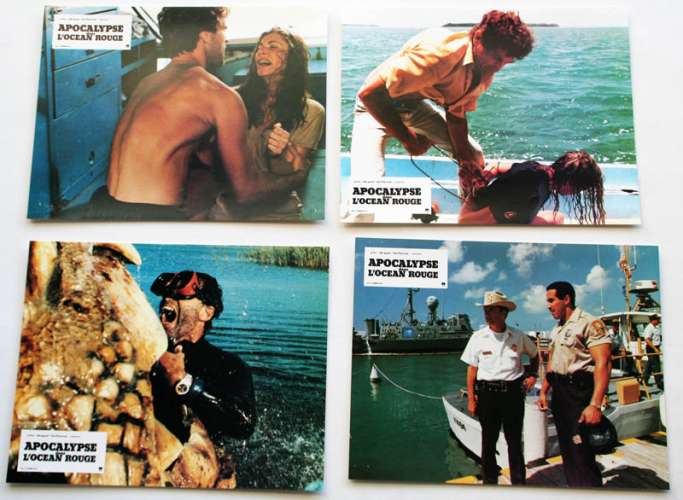Introduction
When deciding what to pick for a 1984-themed blogathon there were many great options. It was a great year. However, many of those were taken so I thought it’d be fun to go off the beaten path. At first I considered something foreign or very obscure. What ended up happening was that it turns out I had written about many of my favorites already. So that introduced a new possibility: something memorably bad; the only debate was “Do I want to write about two bad movies in a row?”
When I decided I did I was instantly surprised. Little did I know that when I chose Devil Fish there would be quite a few things about it to uncover that I had not known prior to starting on this post.
In the beginning, when I first saw it it was just another in the myriad of unfortunate works of cinema that Mystery Science Theatre 3000 introduced me to. Having revisited the film and asking myself questions like “Who wrote this?” and “Who directed this?” I came across some interesting answers that with more experience allowed me to better understand one of the eternal questions about bad films which is “What the hell happened there?”
So the first and most significant discovery I made regarding this film was that the director behind the credit of John Old, Jr. is in fact Lamberto Bava. This being the same Lamberto Bava of Macabre, and a film I have come to love when I just had to see it (as I wrote a short script in the same milieu) Demons. As it turns out he slapped a pseudonymous credit on a few of his works that were in the Italian low-budget rip-off arena. Fashioning this nom de plume after his father’s. Legendary Italian director Mario Bava had many great films but he did the occasional film he felt the need to take a John Old credit for.
Devil Fish is one of countless titles that have sought to cheaply gain an audience by playing off the popularity of Jaws, which will be eternal. I’m not one who tosses about the rip-off phrase about lightly. However, one can scarcely find a shark movie made after 1975 that doesn’t pattern itself after Jaws in some way, shape or form. This doesn’t have the failed tongue-in-cheek homages that say Sharknado has, but it definitely borrows liberally and was produced less than a decade after the original while Universal was still littering the landscape with subpar sequels.
Behind-The-Scenes
So that was one thing, but wait there’s more! As it turns out most of the behind-the-scenes talent took on pseudonyms as well. Usually in this case they are somewhat anglicized versions of their given names. For example, cinematographer Giancarlo Ferrando became John McFerrand. Now, one could try to argue that part of the attempt is to make the film seem more genuinely American-made. However, all of the cast doesn’t play ball and one of the go-to jokes for the MST3K crew was “We’re from Europe!” so no one was being fooled.
Beyond the names there are plenty of things to scratch your head about in wonder, or to at least note. Firstly, is that much in the Italian tradition actors came from all over the place and spoke several different languages while the camera rolled and then the dialogue was dubbed to create a uniform soundtrack. That by itself does not guarantee a bad film. I’ve seen well-dubbed works and many of the better low-budget Italian films were made the same way.
Getting back to the Jaws rip-off angle leads to one of the most infuriating parts of this film. There are several underwater shots that are supposed to tease the creature much like Bruce was scarcely seen. The problem here is that it is very difficult to decipher, at times, exactly what you are looking at. Instead of suspense all this builds is confusion, sighs and unintended humor.
The aforementioned John McFerrand’s score is one of the facets that heavily confuses the issue in this film. It sounds like the kind of antithetical music that makes a lot of giallo and Italian horror work but here it just seems to be terribly out of place, drown things out and distract from what the film is trying to accomplish. Just what that is at times is also confused, but you know what I mean.
Dialogue
What would a bad movie be without bad dialogue? It’s almost impossible. Much as great movies have memorable lines, bad movies do as well. A few gems that really stand out. Here are a few of those notable exchanges:
“Full of hate?”
“Hate.”
“Yes…That’s it….hate.”
“Do you think it was an accident or that she committed suicide?”
“I don’t know I think that’s for you to decide.”
“Yeah, right on. I think I’ll decide on suicide.”
“Lots of new things in this town lately waitresses, sharks, and ladies who call a taxi and take a bath.”
“A million years of solitude is a long time. I bet it’s just dying to boff something.”
Editing
In continuing the laundry list there is also a fair deal of editorial redundancy in this film. The uninspired editing is due to a number of factors namely the script and budget (which influences the tight schedule this film was made on). Aside from the vague shots of the fish that are supposed induce suspense there are also several shots cutting to Peter drinking repeatedly.
Those motifs aside there are mysterious individual cuts like a cutaway to slow-motion pan up phone line to a clock.
Some support for the effects of the schedule and budget can be found in a Michael Skopkiw online interview here:
I would love to know the definition or formula for a “cult classic”. Lamberto was a very nice, gentle guy as most of the Italians are. But you know, the budget on these films would prohibit a Ron Howard from making anything great! These directors are working with a cast from at least three different countries speaking diverse languages and a mixed crew of Italian /American production team on a very tight budget. Lamberto , like most of the foreign crew, loved coming to the States and drinking in as much of our culture as they could get. (The hills of Georgia have a unique personality somewhat portryed [sic] in this film.) We had a crisis one day as a holiday was approaching and the Iataian [sic] film crew wanted to get back to their families. We had been working for 13, I think, long consecutive days in freezing mountain water and adverse conditions and both the cast and Lamberto were wearing thin. The crew wanted to plow right through but I had a good talk with Lamberto and pointed out how the film suffered further if we just continued. He finally went to the producers and they gave us a day off (which they were contractually obliged to anyway). So he did have a heart and tried to do what he could with what he had.
However, the decisions are the decisions regardless of what forced them and many films have succeeded with small budgets and tight schedules, myriad examples of both exist running the gamut of genres.
Even when cuts aren’t technically awkward the narrative makes them aesthetically unintentionally comedic or uncomfortable like a cut from a dolphin to a legless corpse and a cross-cutting sequence between a sex scene (that’s fairly gratuitous) and a murder.
Blame
In terms of writing it could be the speed and the number of chefs in the kitchen that lead to a film that referring to as half-baked would be greatly generous.
As I’ve intimated before one cannot blame the inspiration for what the inspired do with it. Meaning that you can’t hold it against Psycho for the rash of slasher films that eventually took their cue from it. Similarly, Jaws cannot be held accountable for the rash of pale imitations telling tales of terrors from the deep.
Characterization
In this film the characters don’t really get established, they just are. If you need further evidence of this it gets reinforced later on when there’s a climactic scene, where the stakes should be high and the revelation is large and to an extent you’re confused as to who the parties are; therefore, you haven’t time to care about what they have to hide and what they have to gain.
Part of that has to do with how many characters there are and another part of it has to do with the dubbing. I’ve written on dubbing a few times. In short, my stance is that it can be an artform, there is a technique to it and it can be well done, but all too often it is not. In this film is most definitely a detriment. It’s not just about matching, but about performance, but when the same language is not being spoken on set you have a harder time creating a unified vision on film.
Backfiring
It seems almost impossible to say after all of this, however, all is not entirely lost in this film. However, in the true nature of this film that adds to the frustration instead of just imbuing a modicum of appreciation. There are themes that excised from the narratives are fine. There are permutations of the giant, monstrous fish tale that aren’t terrible.The isolated concept of manipulating science, the twists employed, underwater knife fights and not seeing the monster are fine when all has not already been lost. When the movie has already lost hope then these things just make it longer, more boring, unintentionally comedic and worse.
As if you needed further proof that there are things worth working with here this film was remade as Sharktopus on Syfy a few years back. Likely another wasteful effort, but there was something to mine there indeed.
Furthermore, touching on the aforementioned twist again, the mysteries this film plays hurt it. It’s a case where perhaps further, quicker revelation would have elevated it.
Conclusion
What is there to conclude about a film such as this? Not much different than other terrible movies that are of the MST3K ilk. I recall reading about The Beast of Yucca Flats and its making, or watching the special features on their take of Manos: Hands of Fate; what I got there was there’s always a story and that was the spirit I undertook this venture in. What was surprising was that I found more of a story than I expected. Having said all this, can I, as I did with Reefer Madness, recommend you watch this anyway? I can’t do so without aid from the Satellite of Love. Your tolerance for cheese has to be really high. If you want to see either Bava at their best I suggest you stray from titles where they were credited as being “Old,” unless you want to end up prematurely in that state yourself.








A most excellent post, thanks!
When I noticed Devilfish had been claimed for the blogathon, I wondered if the one who chose it had seen the MST3K version. It’s nice to know that you have because I can’t imagine watching the original version! You brought up my biggest frustration with the movie in that the monster is so hard to see in the water segments. The dubbing never bothered me, but the editing (especially the quick cuts at the beginning) was laughable.
My favorite line from the MST3K episode comes from Mike near the end of the movie: “Get your flamethrowers out, grab a stick of Juicy Fruit!”
Ms. Coolsville,
Thanks for reading and for the comment. The dubbing definitely fell down the list of things that bothered me, but in blogathons I tend to go whole hog in discussing everything. Yes, that episode is one my favorites. Thanks, again.